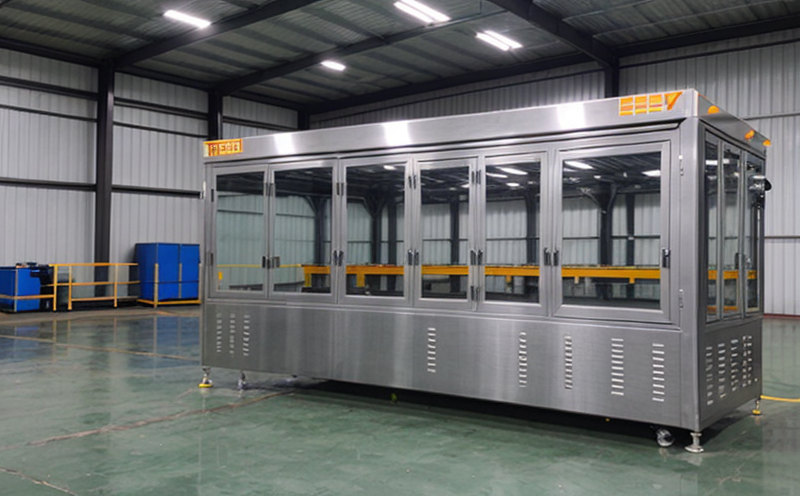ISO 6892-6 Tensile Testing of Thin Foils
The ISO 6892-6 standard provides a comprehensive approach to tensile testing, which is critical for the evaluation and characterization of thin foils used in metal packaging. This service ensures that quality managers, compliance officers, R&D engineers, and procurement teams can confidently assess the mechanical properties of materials used in packaging.
The test method described in ISO 6892-6 involves subjecting a specimen to controlled tension until failure occurs. The tensile strength and elongation at break are key metrics that help determine the suitability of thin foils for various applications, such as food and beverage cans or aerosol containers. Understanding these properties is essential for ensuring product safety and compliance with regulatory requirements.
Thin foils used in metal packaging often undergo rigorous testing to ensure they meet specific standards. These materials are typically made from alloys like aluminum, which offer excellent strength-to-weight ratios but can be prone to deformation or failure under certain conditions. By performing tensile tests according to ISO 6892-6, manufacturers and suppliers can validate that their products will perform reliably in real-world scenarios.
The testing process involves several critical steps:
- Specimen preparation: Ensuring the sample is representative of the material being tested
- Instrumentation setup: Using appropriate fixtures and equipment to apply controlled tension
- Data collection: Recording stress-strain curves throughout the test duration
- Analysis: Interpreting results against accepted criteria outlined in ISO 6892-6
The application of tensile testing ensures that thin foils used in metal packaging meet stringent quality benchmarks. This service supports industries where material integrity is paramount, such as food and beverage manufacturing or pharmaceutical packaging.
By adhering to ISO 6892-6, laboratories can provide accurate, repeatable, and reliable data that help decision-makers select the best materials for their products. The insights gained from these tests contribute significantly to improving product performance while maintaining compliance with international standards.
The process of tensile testing also helps identify potential weaknesses in packaging designs early in the development cycle. Engineers can use this information to refine manufacturing processes and improve overall product quality before reaching commercialization stages.
Applied Standards
| Standard Number | Description |
|---|---|
| ISO 6892-6:2014 | Tensile testing of metallic materials - Part 6: Tensile testing of thin foils and wires |
The ISO 6892-6 standard is widely recognized for its robust guidelines on tensile testing. It specifies the methods for determining mechanical properties, including ultimate tensile strength (UTS), yield strength, and elongation at break.
Compliance with this international standard ensures that tests conducted are consistent and comparable across different laboratories worldwide. This consistency is crucial when working internationally or collaborating with suppliers who adhere to global standards.
Customer Impact and Satisfaction
- Improved product quality through rigorous testing procedures
- Avoidance of costly recalls due to substandard materials
- Better understanding of material behavior under various conditions
- Enhanced reputation among clients for providing high-quality services
- Increased competitiveness in the market by meeting stringent industry standards
Customers who utilize our ISO 6892-6 tensile testing service benefit from reliable data that supports informed decision-making. This ensures they choose materials that not only meet current regulatory requirements but also anticipate future challenges.
The insights gained from these tests enable customers to optimize their processes continuously, ultimately leading to improved efficiency and cost savings. By partnering with us, businesses can streamline their supply chains and enhance customer satisfaction by delivering superior products.
Competitive Advantage and Market Impact
By leveraging our ISO 6892-6 tensile testing service, companies in the metal packaging sector gain a significant competitive edge. Our expertise ensures that they stay ahead of regulatory changes and technological advancements.
This service allows businesses to:
- Stay compliant with international standards
- Rapidly adapt to new market demands
- Demonstrate superior product quality to potential clients
- Reduce risks associated with substandard materials
- Increase customer trust through transparent testing practices
The ability to offer reliable data and consistent results positions our customers as leaders in their respective fields. This reputation fosters long-term relationships and encourages repeat business, contributing to sustained growth within the industry.
Moreover, by ensuring that all aspects of packaging are thoroughly tested, we help minimize environmental impact through optimized design and resource efficiency. Our commitment to sustainability aligns with global trends towards more responsible manufacturing practices.





